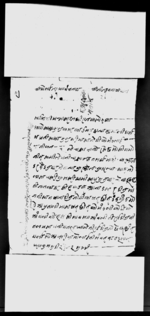Copy of a rukkā from King Raṇabahādura reconfirming Gosāī̃ Bhagavantanātha as central overseer of jogīs (VS 1843)
ID: K_0469_0010
Edited and
translated by Christof Zotter
Created: 2016-04-21;
Last modified: 2018-06-18
For the metadata of the document, click here
The accompanying edition, translation/synopsis and/or commentary are available under the terms of the Creative Commons Attribution-ShareAlike 4.0 International License
Abstract
In this rukkā King Raṇabahādura Śāha reconfirms the appointment of Gosāī̃ Bhagavantanātha as central overseer (maṇḍalāi) of jogīs and informs officials throughout the country that every household among specified groups shall pay one ānā as dastura. Furthermore, certain fines, fees and escheated property from the jogīs are assigned to the maṇḍalāi.Diplomatic edition
[1r]
⟪11⟫1श्रीगोसाईज्यूभगवंन्तनाथ2१1श्रीजीज्यूवावाश्रीवावा
2२1⟪रुजुदुरुस्तले
2मलाल⟫[seal]1⟪सक्कलवमोजींनक्कलदुरुस्तछभनीसहीछापगर्ने
2⟪रानागाऊ⟫मठकाडीट्ठातीलक्वाहादुरचं⟫[seal]1स्वस्तिश्रीमन्महाराजधीराजकस्येरुक्का¯ ¯¯ ¯¯
2आगेहाम्रामुलुकभरकाऊमराद्वार्याअमालीदार्स
3भप्रतीहाम्रामुलुभरिमाहाजोगीकोमंडलाई¯ ¯ ¯ ¯ ¯ ¯
4¯ १¯ जीकन¯ ¯ २¯ लेचर्हाय़ाकोरहेछसोहीवमो
5जीम्हामीलेपनीचर्हाञ्यूतसर्थमाझी•कम्हाल
6दरवै़दनुवार नेवार्याकुह्माल•कुस्ल्या•थारूजो
7लाहापहरीकुसहरीथामीहायु़•सुनुवार•चेवाङ्•ए
8तीजातकाघरहीएक्एक्आनादस्तुरदीनुसा
9जवीहानषानादिनुजोगीकाषत्छीत्दंडकुंडमो
10रोअपुताली•माहा•षत्छीत्को•मंडलीको•टीको
11अंवलीकोएसहीसावसगअंवलीतीराईदीनुवी
12तलमहापनीवतलप्यालेतीराईदीनुजोछेक्थुंन्
13गर्लासोअप्सरीय़ाहोलाईतीसंवत१८४३साल्
14फाल्गुनसुदी२रोज२शुभ्म्ं¯¯ ¯¯¯¯ ¯¯¯¯
Translation
[1r]
111
Venerable Bhagavantanātha
1
Venerable Grandfather [and] Venerable Father
2
Attested as correct [by] Bhīmlāla
Assenting that the copy is in accordance with the original, the ḍiṭṭhā of Rānāgāũ Maṭha Tīlaka Bāhādura Cã2
Hail. [This is] an executive order of the supreme king of great kings.
[Regarding] the following: To all umarāus, dvāres [and] amālīdāras throughout our realm (muluka)
The office of central overseer (maṇḍalāī) of jogīs was offered3 to -1-4 -jī by [our] -2- 5 . Accordingly, we, too, have offered [him the office]. Therefore, every house of the [following] groups (jāta): mājhīs, kumāles,6 darāis (text: daravai), danuvāras, nevārakumāles, kusles, thārūs, julāhās, paharīs, kusaharis, thāmīs, hāyus, sunuvāras [and] cepāṅs (text: cevāṅ)7 shall give one ānā [to you for Bhagavantanātha and his order] as a customary [yearly] fee (dastura) [and] offer food [to the jogīs] morning and evening. The amālis shall arrange [the money] to be paid [relating to] jogīs' illicit sexual relations (khatachita), 8 [other] fines, escheated property (i.e. the property of jogīs who die childless), the mahākhatachita9 [and] the maṇḍalī's ṭiko10 according to the amāli (text: aṃvalī) rates 11 for these. 12 In the bitalapa, too, [the tenants]13 should be made to pay by the bitalapa holder (bitalapyā, text: vatalapyāle). He who obstructs [this arrangement] will be [considered] a rebel (apsariyā).
Monday, the 2nd of the bright fortnight of Phālguna of the [Vikrama] era year 1843 (1787 CE). Auspiciousness.
Commentary
For earlier documents related to the maṇḍalāi of Bhagavantanātha, see DNA_0014_0050, K_0469_0008 and K_0469_0009.

